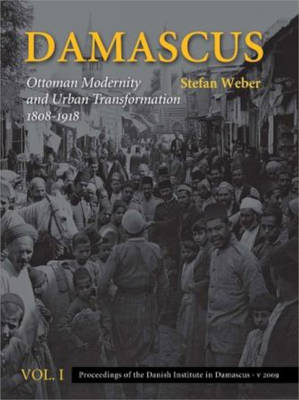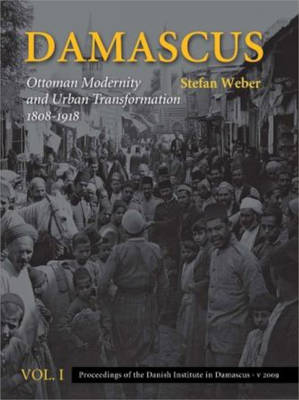
Bedankt voor het vertrouwen het afgelopen jaar! Om jou te bedanken bieden we GRATIS verzending (in België) aan op alles gedurende de hele maand januari.
- Afhalen na 1 uur in een winkel met voorraad
- In januari gratis thuislevering in België
- Ruim aanbod met 7 miljoen producten
Bedankt voor het vertrouwen het afgelopen jaar! Om jou te bedanken bieden we GRATIS verzending (in België) aan op alles gedurende de hele maand januari.
- Afhalen na 1 uur in een winkel met voorraad
- In januari gratis thuislevering in België
- Ruim aanbod met 7 miljoen producten
Zoeken
€ 256,95
+ 513 punten
Omschrijving
Damascus, capital of the Ottoman province in Syria and one of the most important centres of the classical Muslim World, underwent some of the same developments in the 19th century as other urban centres in the Mediterranean area and beyond. In the course of the industrial revolution in Europe and the radical expansion of a worldwide network of traffic and communication, new ideas, techniques, material goods and architectural forms spread and challenged locally established patterns of urban and social organisation. This expansion and integration led to an increase in orientation of urban and social structures towards supra-regional models seen, for example, in architecture of houses, public buildings and bazaars or urban organization and clothing. Yet Damascus never became a "European city", but modernised in its own, unique ways. This study examines the society, architecture and urban planning, including the documentation of over one thousand buildings and public spaces, of the endangered UNESCO World Heritage Site of Damascus. The history of these buildings and their transformation are discussed, and many unpublished historical photographs provide an insight into lost and unknown private worlds and urban textures. From a micro-historical approach, this book unfolds the spaces of the everyday life of local actors and agents to unearth and relate the complexity and nonlinear quality of the processes, which transpired as an integral turning point in the history of the Middle East with its entry into modernity.
Specificaties
Betrokkenen
- Auteur(s):
- Uitgeverij:
Inhoud
- Aantal bladzijden:
- 1200
- Taal:
- Engels
- Reeks:
- Reeksnummer:
- nr. 6
Eigenschappen
- Productcode (EAN):
- 9788779344242
- Verschijningsdatum:
- 27/01/2010
- Uitvoering:
- Hardcover
- Formaat:
- Genaaid
- Afmetingen:
- 290 mm x 333 mm
- Gewicht:
- 5828 g

Alleen bij Standaard Boekhandel
+ 513 punten op je klantenkaart van Standaard Boekhandel
Beoordelingen
We publiceren alleen reviews die voldoen aan de voorwaarden voor reviews. Bekijk onze voorwaarden voor reviews.









